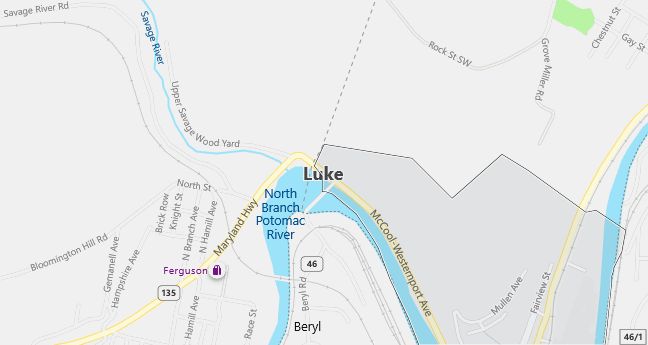Moving to Luke, Maryland
The beautiful valleys of Western Maryland, where the Potomac River starts its winding course to the nation’s capital, first attracted settlers in the early 1770s. Among the first arrivals were the Davis brothers, who established a saw mill where the town of Luke now stands. The mill provided cross-ties to the Baltimore and Ohio Railroad as it pushed its rails westward through the Piedmont area of what is now West Virginia. When the railroad suspended building in the 1880s, the Davis brothers disbanded and sold their property to the West Virginia Pulp and Paper Company.
About that same time, William Luke and two of his sons arrived. They assiduously applied themselves to developing the the place they had adopted. When the railroad needed a name for the stop it established there, it happily accepted “Luke.”
Over the next several decades, Luke prospered with the operation of the paper mill, the influx of other “heavy” industrial concerns, and the establishment of the usual supporting Mom and Pop businesses. Nearby, along the Savage River, there was a gun factory that provided muskets with bayonets for the United States Army at Harper’s Ferry.
With Luke’s growth came citizens’ concerns about educational and social issues. Schooling in private homes and business buildings was relocated to a two-room schoolhouse. Growing enrollment in the first through eighth grades brought about construction of a fine new school that opened in September, 1913. It served the town well for forty-six years, sending well educated students off to high school in Westernport. When the school closed in 1959, the building was converted for use as the town’s administrative offices—the City Building.
Luke has changed from a booming industrial town to a small quiet community with an appreciated big neighbor in its back yard— the Westvaco Corporation, successor to the West Virginia Pulp and Paper Mill. With the population declining, homes and businesses have been purchased and demolished to make room for Westvaco’s expansion. There are no small businesses left within the town’s corporate limits. People who live, or have lived, in Luke never lose their affection for the community, as witnessed by the hundreds of people who converge for the town’s annual August Homecoming. As far as they are concerned, Luke should be the blueprint for all American towns.

